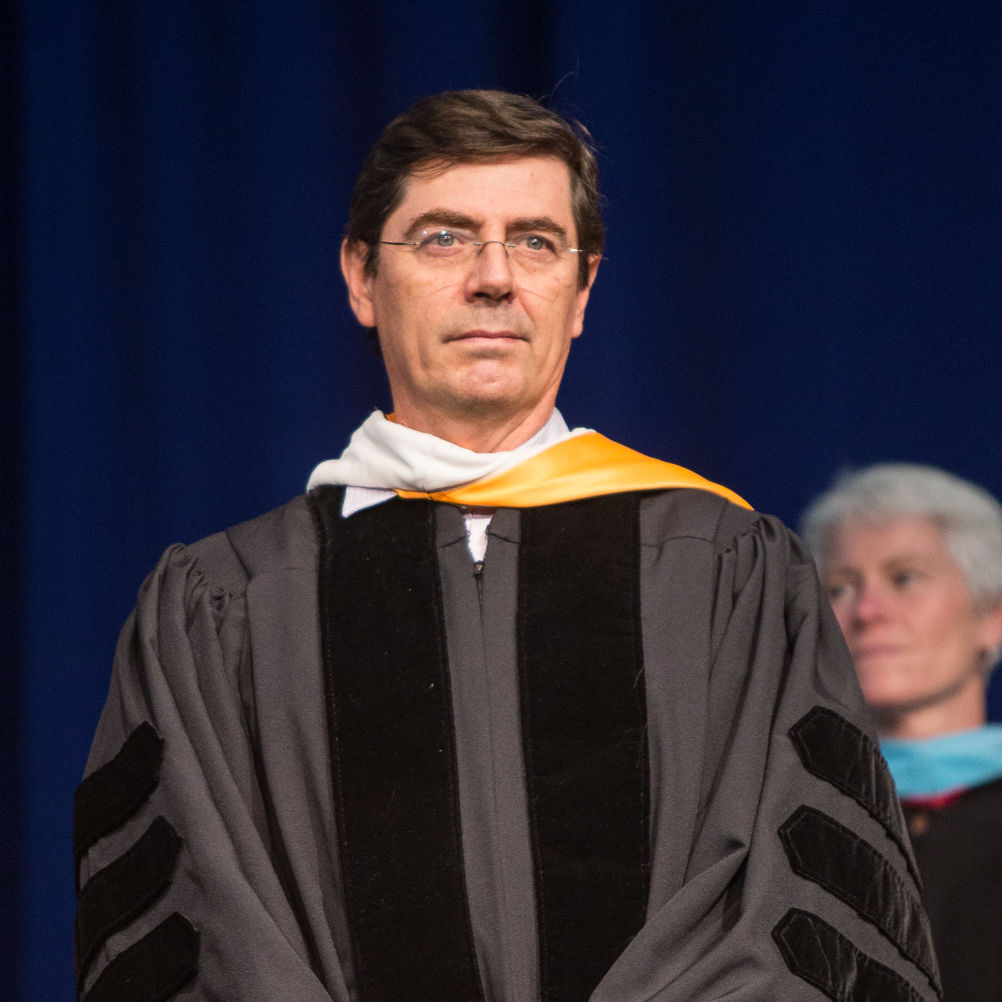F&M Stories
James Strick: Bradley R. Dewey Award for Outstanding Scholarship
Presented at the 2016 Commencement of Franklin & Marshall College:
The Bradley R. Dewey Scholarship Award recognizes the faculty member who best exemplifies "the ideal of the scholar whose research efforts reflect and inspire excellence and enlighten teaching."
Professor James Strick is deeply engaged in a diversified program of research that has attracted impressive recognition among his professional colleagues. His work is broad in scope, with strands that draw in different ways on his background in microbiology and his training as a historian. Early in his career, Professor Strick won a prize from the History of Science Society for work on a mid-20th-century controversy over the nature of the bacterial flagellum. Here, he signaled his enduring interest in exploring work involving well-designed experiments, often conducted by "outsiders," that yielded ambiguous results and was widely rejected, before later proving to explain anomalies that had been misunderstood.
Professor Strick's best-known work is on a resurgence of late 19th-century interest in the possibility of spontaneous generation of life. Sparks of Life, published by Harvard University Press, received warmly approving reviews from leading scholars in microbiology, philosophy, and history. Professor Strick went on to prepare a scholarly edition of the works of Henry Charlton Bastian, whose scientific reputation he had revived. This led to an invitation to organize a workshop in the history of biology for the Dibner Institute, an editorial appointment with Isis (the premier journal in his field), and election to the Council of the History of Science Society.
Professor Strick then turned to work collaboratively with a leading historian of astronomy on NASA's involvement in promoting studies of the origin of life, including work by such notable "outsiders" as Lynn Margolis and Carl Woese. The Living Universe was accorded enthusiastic reviews in Isis and the Journal of the History of Biology and significantly broadened interest in Strick's research. This led him to a perceptive study on the origin and development of the still-controversial Gaia hypothesis promoted by Margolis and James Lovelock.
Meanwhile, Professor Strick had turned the main focus of his prodigious energy to a major study of experimental work by a man who has the unique distinction of having his books burned by both the Nazis and the U.S. Food and Drug Administration. In Wilhelm Reich, Biologist (Harvard, 2015), Strick investigated the work of an Austrian physician, trained as a Freudian psychoanalyst, who devised experiments attempting to show that libido is a tangible physical force that can be measured. These "bion experiments," as Reich called them, led to an unorthodox theory of the origin of cancer cells and the discovery of a form of radiation that he supposed to be the ultimate "life force." The preservation of Reich's laboratory notebooks made it possible to test his claims. Strick concludes that his persecution in Europe and the U.S. was unjustified. It will take time for scholars to fully digest this fundamental reassessment of Reich's work that reviewers find bold, authoritative, and persuasive.
Professor Strick is an outstanding teacher who challenges his students to think deeply and question the assumptions of everything they hear and read. His broad scholarly work underwrites courses on scientific revolutions, environmental studies, "nuclear weapons, power and waste disposal," environmental history, "sex, lies and book burning," and the history of medicine. Students revere him as a stimulating, wise, and supportive mentor whom they hold in the highest regard. In this and every other way, James Strick is a most worthy recipient of the Bradley R. Dewey Award.
Related Articles
February 24, 2026
Brett Harwood ’71 Makes $1 Million Gift to Support Jewish Life, Student Experience
A transformational gift of $1 million from Brett Harwood ’71 will support F&M’s vibrant Jewish life programming, foster campus dialogue, fund a faculty position and boost the College’s student retention efforts.
February 24, 2026
Great Food, Strong Community: Dining at F&M Evolves with Student Tastes
Enjoy a comforting meal with friends and colleagues. Refuel before class or after practice. Build relationships that define the Franklin & Marshall community. All this and more happens at F&M’s beloved “D-Hall.” Every day, the Restaurants at Ben Franklin — the actual name of the College’s primary dining facility — welcomes hundreds of students, faculty and professional staff.
February 24, 2026
What Does Leadership Mean to F&M Students?
We asked Franklin & Marshall students: What defines leadership? The breadth of answers demonstrates the College’s endless opportunities to learn and lead.

